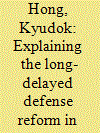| Srl | Item |
| 1 |
ID:
147391


|
|
|
|
|
| Summary/Abstract |
This study explains why defense reform efforts in South Korea have failed to achieve substantial progress. The outcome would seem all the more unexpected because the Blue House has ostensibly wanted comprehensive defense reform, while the Korean military is also highly motivated to upgrade itself to be able to fight and defend itself against North Korea, which has continuously threatened to use nuclear weapons preemptively. How should we account for this puzzle? This study focuses on three factors to explain the absence of reform: the role of the president, the opposition from the armed forces leadership, and lapses in the civilian control of the military. This study concludes that South Korea needs to revitalize the reform process in order to successfully confront the security challenges of the twenty-first century. Defense reform has long been dominated by the military leaders. It has resulted in the unwanted situation where civilian leaders have been alienated. Ironically, lack of interest among civilian leaders leads to the lack of support from outside. In order to achieve successful defense reform, assistance from the outside must be guaranteed. South Korea needs to readjust goals and prepare for building robust armed forces to play a decisive role in achieving the mission to meet the requirements of changing strategic environments. The Park administration also needs to take timely steps to overcome its own vulnerabilities, such as modifying its doctrine, equipment, training, and culture. Elimination of its vulnerabilities may involve changes in philosophy, tactics and possibly even modifications to the concepts of operations. All can entail substantial costs. However, the cost of not dealing with the threats is likely to be much higher.
|
|
|
|
|
|
|
|
|
|
|
|
|
|
|
|
| 2 |
ID:
148539


|
|
|
|
|
| Summary/Abstract |
This study explains why defense reform efforts in South Korea have failed to achieve substantial progress. The outcome would seem all the more unexpected because the Blue House has ostensibly wanted comprehensive defense reform, while the Korean military is also highly motivated to upgrade itself to be able to fight and defend itself against North Korea, which has continuously threatened to use nuclear weapons preemptively. How should we account for this puzzle? This study focuses on three factors to explain the absence of reform: the role of the president, the opposition from the armed forces leadership, and lapses in the civilian control of the military. This study concludes that South Korea needs to revitalize the reform process in order to successfully confront the security challenges of the twenty-first century. Defense reform has long been dominated by the military leaders. It has resulted in the unwanted situation where civilian leaders have been alienated. Ironically, lack of interest among civilian leaders leads to the lack of support from outside. In order to achieve successful defense reform, assistance from the outside must be guaranteed. South Korea needs to readjust goals and prepare for building robust armed forces to play a decisive role in achieving the mission to meet the requirements of changing strategic environments. The Park administration also needs to take timely steps to overcome its own vulnerabilities, such as modifying its doctrine, equipment, training, and culture. Elimination of its vulnerabilities may involve changes in philosophy, tactics and possibly even modifications to the concepts of operations. All can entail substantial costs. However, the cost of not dealing with the threats is likely to be much higher.
|
|
|
|
|
|
|
|
|
|
|
|
|
|
|
|
| 3 |
ID:
075508


|
|
|
| 4 |
ID:
092518


|
|
|
| 5 |
ID:
060648


|
|
|
| 6 |
ID:
163784


|
|
|
|
|
| Summary/Abstract |
This study begins by introducing the UN Secretary–General’s new drive for
reforming the architecture of UN peace operations and why South Korea needs to
seize the moment by responding positively to the A4P Initiative. This study suggests
that South Korea should explore new strategies by hosting the Peacekeeping
Ministerial Meeting in 2022 and preparing for delivering its strategic message to the
world to become a key player in UN peace operations. This study argues that South
Korea’s active participation in international peacekeeping activities would not only
have a positive effect on building a future-oriented U.S.–South Korea alliance but
also on contributing further to bring a regional peace as President Moon’s emphasis
on bringing peace through political settlement has much in common with Secretary–
General Antonio Guterres’ principle of enhancing political strategies to advance
lasting political solutions. Finally, this study strongly recommends that South Korea
must explore new modes of contribution rather than sticking with boots on the
ground. This study also touches upon diversification by suggesting the inclusion of
civilian experts and police components to the existing military–only peacekeepers.
As mentioned by the Independent Panel on UN Diplomacy, the reorganization
and expansion of the PKO center also needs to be considered as a high priority.
Having said that, South Korea’s new strategy must start with small steps to create
an initiative to earn support from many strategic partners in the field, officials from
UN headquarters and receiving states. This study concludes with seven policy
recommendations, hoping that South Korea transforms itself into a frontrunner for
building a robust PKO and making future peacekeeping more effective.
|
|
|
|
|
|
|
|
|
|
|
|
|
|
|
|